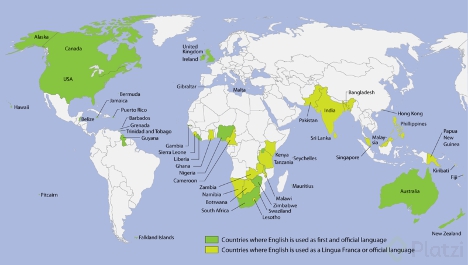Is it difficult to achieve a native-like pronunciation as an adult language learner? The answer is: yes. But, that doesn’t mean it isn’t achievable! It may take you some time and effort but I am here to assure you: IT IS POSSIBLE.
If you are interested in sounding more like a native-speaker I encourage you to start by getting acquainted with the culture of English-speaking countries, such as: United Kingdom (British culture) and United States (American culture). This way, you will begin to identify yourself with the members of that specific culture and, with practice, you will slowly start to ‘sound’ more like them.
Where can you start?

Geography of English-speaking countries (See References).
What makes achieving native-like pronunciation difficult for English as a Second Language (ESL) students?
When you are learning English, you may encounter sounds that are not part of the sound inventory of your own native language. At the beginning, most ESL students are not able to produce certain sounds because they have never exercised their mouths in that particular way before. It’s like going to the gym to lift weights for the first time, it ain’t easy!
Another reason is that the rules for combining sounds into words in English may be different in your first language. Moreover, patterns of stress and intonation, which determine the overall rhythm and melody of a language, can be transferred from your language into English. And to top it all, it is definitely possible that you are hearing English words through the sound system of your native language!
“It is as if learners hear the second language through a ‘filter’, the filter being the sound system of the native language.”¹
I know none of this sounds uplifting. However, these barriers can be overcome with PRACTICE.
And, what if you DON’T want to sound like a native-speaker?
It is perfectly understandable if you wish to improve your pronunciation in order to make yourself more comprehensible, but, at the same time, are not interested in sounding like a native-speaker.
“The achievement of fluent and eloquent intelligibility need not be at the expense of a proud and personal identity”.²
We should all remember that it is very important to preserve our own cultural identity. And, a ‘foreign’ accent is a marker of that identity. We should all feel proud of our accents!
So you don’t have to get rid of your ‘foreign’ accent?
Absolutely not. But, you do need to work on your pronunciation to find clarity, fluency and expression. If you can’t be understood by your listener, your thoughts and feelings will never be communicated.
In the Advanced Pronunciation Course we will work on your awareness, so you can determine what aspects of pronunciation you need to improve. Don’t forget: constant practice is crucial for your own improvement. Lastly, don’t be disheartened when it gets difficult. When an exercise is hard it is time to celebrate! It means that you have an opportunity to learn.

Photo by: Denis Linine
References:
¹ Avery, P., & Ehrlich, S. (2019). Preliminaries to Teaching Pronunciation. In B. Collins, I. M. Mees, & P. Carley (Authors), Practical English Phonetics and Phonology: A Resource Book for Students (4th ed., p. 261). London: Routledge.
² Crystal, D. (2019). Teaching the Pronunciation of English. In B. Collins, I. M. Mees, & P. Carley (Authors), Practical English Phonetics and Phonology: A Resource Book for Students (4th ed., p. 270). London: Routledge.
Map image:
Geography of English-speaking countries - With Flying Colours (2008). Retrieved August 23, 2020, from https://sites.google.com/site/withflyingcoloursherrera/home/maps
woow! I didn’t know that there are many countries in Africa that talk in english 😄 very interesting!
The people in Africa talk so many language like Portuguese, french, English, spanish and others. 😄
¿In which countries of Africa people speak Spanish?
Guinea Ecuatorial has Spanish as official language
Yo puedo comunicarme en español. Eu poderia me comunicar em portugues. Posiblemente io puo fare a comunicazione in italiano . I think I may have a good comunication in English . Je peux me comuniquer aussi en fran}ais.
I loved the phrase at the end “foreign accent is a sign of bravery”, and it truly is! we should not feel intimidated for it. Latin accent is the best 😃
Very interesting article, thank you for sharing.
Great Article Mariana, I’ve just got aware that my speaking got better, I don’t know how, maybe for a tv show I’m currently watching… Mr. Robot, I think it’s time to get back to the english lessons here at Platzi…
Lets go…
Amazing Recomendations
Thank you!!
An advice that I can share you is that you can try biting a pencil while you are practicing, with this you are training your mouth. In the other hand, tray to practice in front of the mirror and speak as if you know what you are saying, gain some confidence, eventually you will be improving
Excellent post!!!
I have read the post and I would like to improve my english, I will buy a platzi membership 😃.
I was just listening to a podcast about the importance of maintaining our culture and even our accent when speaking English from “diseño cha cha cha” c:
All right, I´m going to start with this course, I would like to talk like a native speaker.
Actually it is important to sound like a native speaker but as a foreigner your pronunciation always merges with your real accent and this is part of your identity as Mariana mentions in her article. The important topic for me is practice, and Platzi students can enjoy the learning process. If you want to achieve the goal of mastering the English language, you must live this language .
Thank you Mariana for this wonderful article and this great course.
That’s an interesting topic for cover in a course, thanks Platzi I Hope to be fluent I’ve tried to do without success yet. this is the opportunity.
in my own situation, pronunciation has been the most complicated skill, i hope with the Platzi resources i could reach my objective
Thank you for sharing this article on pronunciation. I myself was raised in NY but now I have lost my american accent which I want to regain because living in a spanish speaking country have made me lost part of the accent. I have found that when you have spanish accent in USA they tend to look at you very different and more of all speaking with american/british accent tends to give you more credibility on whatever topic you´re talking about. A great course, here again Platzi has a course on every area . Thx.
I don’t aim to talk like a native speaker, but I do wish to improve my pronounciation so that my listeners can actually understand what I’m saying. I know how to listen, read and write english pretty well, just not pronouncing the words.
Great article, i should try to practice my pronunciation
Great Article
Noted ! I want to improve my skills
This post is fantastic, I would love to listen to the audio while reading to improve my pronunciation.
no